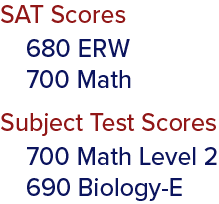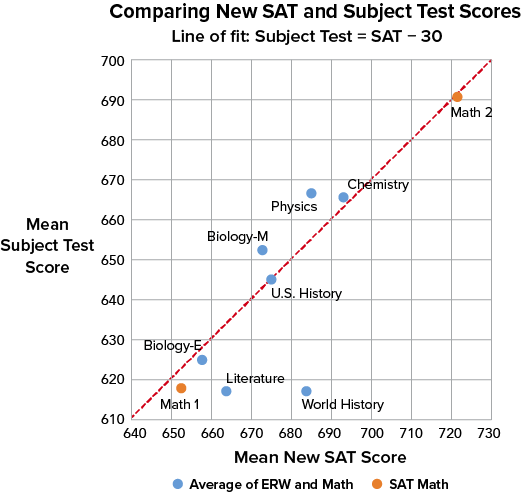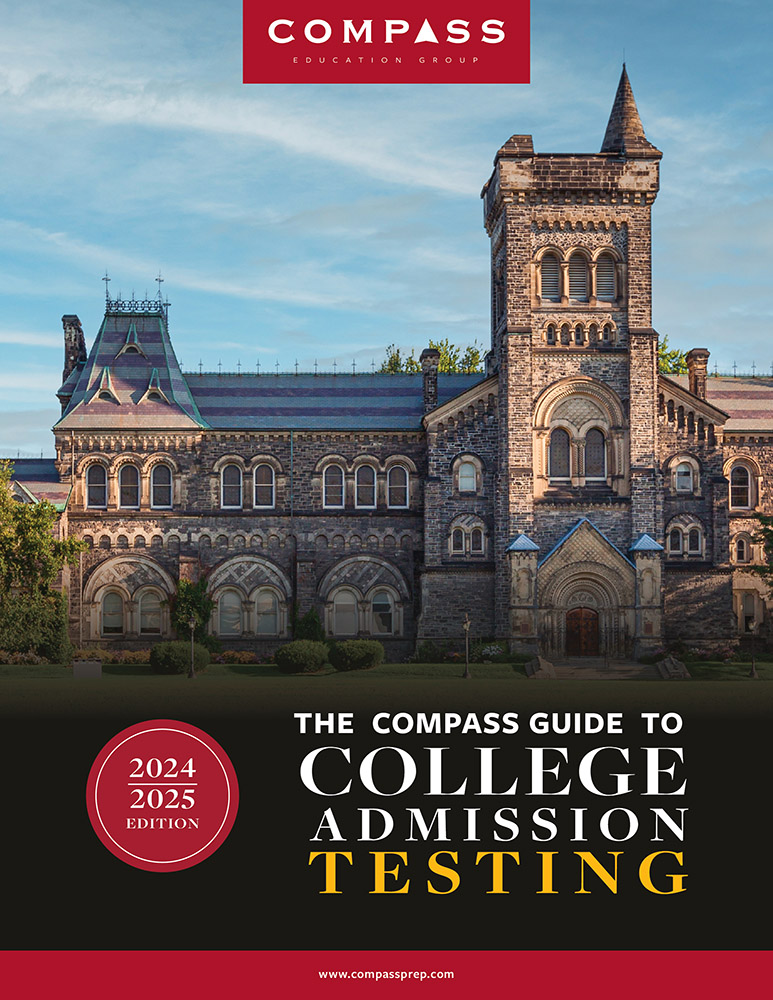On January 19th, 2021, College Board announced that they will no longer administer the SAT Subject Tests in the U.S. and that the Essay would be retired. Read our blog post to understand what this means in the near term and what the College Board has in store for students down the road.
Our articles on Subject Tests and the SAT Essay will remain on our site for reference purposes as colleges and students transition to a revised testing landscape.

Judging performance on Subject Tests can be confusing for students. While most colleges release SAT and ACT score data, almost none regularly provide Subject Test scores. By combining data from College Board with current and historical data from colleges, Compass has come up with advice on how parents and students can assess Subject Test results and make effective testing decisions.
As more schools soften their SAT Subject Test policies, very strong AP exam scores can serve as valuable differentiators. Compass offers AP and academic tutoring in over 50 subjects to help students stay on pace with their coursework. We have a strong team of subject specific expert tutors to guide the program from start to finish. We also offer a Study Skills and Organizational Coaching program to provide students with the tools they need to excel in the classroom.
Compare your scores to your SAT or ACT scores.
The simplest rule of thumb is to shoot for Subject Test scores that match or better your SAT section scores. If, for example, you scored a 710 ERW / 700 Math, then Subject Test scores above 700 should improve your testing portfolio. When assessing your Math Level 1 or Math Level 2 score, it’s best to compare it to your SAT Math score. If you achieved a 750 SAT Math score, a 700 Math 2 score is unlikely to do you any favors. If you took the ACT, you can use a concordance to help with the comparison.
Don’t get hung up on percentiles.
Unfortunately, students are often drawn to percentiles when judging Subject Test performance, and percentiles happen to be extremely flawed measures. The pool of students choosing Subject Tests is small and skews toward high scorers. The pool of test takers also varies dramatically across the different subjects.
Subject Test percentiles are not comparable to SAT percentiles.
Students accustomed to achieving very high percentile ranks can be deflated by Subject Test percentiles, even when they shouldn’t be. For example, a student scoring a 1500 on the SAT would be in the 99th percentile. She might be disappointed, then, to find out that her 750 Chemistry score is 72nd percentile. In fact, she shouldn’t be surprised. The Chemistry test is taken by other students like her — very good testers who are particularly good at Chemistry. Her 750 is not a drag on her testing portfolio, and she should submit it.
Subject Test percentiles are not comparable across subjects.
A 680 in Literature and 770 in Math 2 are both reported as 67th percentile, but they are not equivalent. The simplest way of looking at the scores also happens to be the most accurate — the Math 2 score is 90 points higher and is the better score. The pool of students taking the Math 2 exam is more exclusive than that of those taking Literature. The average SAT Math score among Math 2 takers is 720. The average SAT section score for Literature students is approximately 660. The difference in Subject Test scores does not indicate that one test is easier or harder than the other; it is more of a reflection of the skill and preparation of the test takers.
Compare your scores to the 25th-75th percentile ranks of SAT scores at your target schools.
“Good scores” only have meaning in the context of college choice. At schools where most applicants submit scores, Subject Test scores will roughly align with SAT scores. If Alma Mater College’s 25th-75th percentile range of SAT scores is 680-760 ERW and 680-760 Math, then its Subject Tests scores will not be far off.
Given the testing portfolio below, what should the applicant to Alma Mater College do?

His Subject Test scores are in line with his SAT scores, so that box is checked. However, his scores are at the low end of the 25th-75th range. Test scores, in other words, are not his strength relative to other applicants. Providing Subject Test results may actually hurt him by doubling down on a weak part of his application. He might be applying to other colleges, though, where the exact opposite is true. His SAT and Subject Test scores might put him in the upper range of applicants, and submitting all of his scores would be helpful. Context matters, so consider the college and the program to which you are applying.
It’s perfectly natural to have one of your scores be higher than the other.
Not every score can be your highest. When UCLA used to report its applicant and enrollee Subject Test scores, it provided insight into how students’ scores matched up. On average, a student’s best score was 60 points higher than the second best.
Don’t miss out on the opportunity to display a strength just because Subject Tests are not required.
It makes sense that as fewer colleges require Subject Tests fewer students take the exams. But some students are missing out on an opportunity to highlight their strengths. Compared to just seven years ago, 50% fewer students achieve a 750-800 in Literature and U.S. History. If performance in literature and history were really on the decline, we would have seen this in AP scores. The more likely explanation is that many students have decided to pass up the Subject Test opportunity.
Think about skipping the exams if you are not within striking range of a 700.
None of the 15 U.S. colleges requiring or recommending Subject Tests has average SAT scores below 700 on either the ERW or Math sections. Two-thirds of the schools have average Math scores above 750! Given this landscape, Subject Test scores below 700 rarely add to a student’s testing portfolio.
Of the more than 500,000 Subject Tests taken last year, over 200,000 resulted in scores at or above 700. Approximately 135,000 of those were at 750 or above. At highly competitive institutions, in other words, you need very strong Subject Test scores to positively distinguish yourself. While there are situations where a lower score might be useful, they are limited. Approximately 135,000 scores last year were 600 or below. Students taking those tests would likely have been better served focusing on their SAT and ACT scores.
Your endpoint is not the same as your starting point.
As with any college admission test, preparation can raise scores. Just because an initial practice test or a result from an earlier year is low doesn’t mean that you should throw in the towel. You should, however, be realistic about your goals.
Use Score Choice except where absolutely prohibited.
In virtually all cases, colleges will use your best two scores and will take your better score if you repeat a subject. Score Choice gives you even more control, since you can release only the scores you want to reveal. At the time of this writing, Compass believes that Georgetown is the only college that does not allow Score Choice for Subject Tests. It’s also the only college that recommends 3 Subject Tests.
Are 200-800 scores identical to the 200-800 scores on the SAT?
Not really, but it can be a convenient shorthand. When Subject Tests — they’ve been called Achievement Tests and SAT IIs over the years — were created, the SAT scores of test takers were used to help calibrate the scales appropriately. What our research has shown is that, with the exception of foreign language exams, the old SAT scores of test takers were closely matched with Subject Test scores. [See our archived post for more detail.] Students taking Chemistry, for example, achieved an average score of 666. Those same students have an average section score of 663 on the old SAT.
This relationship was useful to College Board in setting the scales of tests such as Math Level 1 and Math Level 2. Students taking both the old SAT and the Math 1 Subject Test saw similar results on the two exams. They averaged 628 on the old SAT Math section and 619 on the Subject Test. While more difficult than Math 1 and taken by a more skilled pool of students, Math 2 results showed the same alignment. Students averaged a 693 on the Subject Test and 690 on the old SAT Math section.
Then things got weird. The new SAT changed many of the rules by redefining the 200-800 scale, eliminating the guessing penalty, and even changing how percentile ranks were calculated. The correlation between SAT and Subject Test scores still holds, it’s just that we need to think of new SAT scores as “inflated.” In the typical 600-800 range of Subject Test takers, a section score on the new SAT went up about 30 points versus the old SAT. The Math 2 students who averaged 690 on the old SAT now average 720 on the new SAT.
Below is a chart of the relationship between average SAT section scores and average Subject Test scores. The points don’t follow the line exactly, but most Subject Test scores are 20-40 points below the average test takers’ comparable SAT scores.

World History is a significant outlier. The test material doesn’t align neatly with high school coursework, and it is challenging to achieve a high score. Foreign language tests are not included here because the SAT score alone is a poor predictor. Some tests, such as Chinese and Korean, are taken primarily by native speakers. Others, such as French and Spanish, are taken by a mix of native speakers and those learning the languages in high school.
If Subject Test scores are 20-40 points lower, on average, than SAT scores, why does Compass recommend test takers try to at least reach their SAT scores?
Subject Test takers average 2.5 exams during their high school careers. Many high-scoring students take three or four exams. Since most colleges only ask for two Subject Tests, and since students will submit their best two, average reported scores are higher than the average of all received scores. Low scores can be hidden through the power of Score Choice. This leads to the advice that Subject Test scores above your SAT scores are far more likely to improve your testing portfolio than those below.
The tables below provide a summary of current Subject Test data. The mean Subject Test scores are compared to the average SAT section score of test takers. In the case of the Math Level 1 and Level 2 exams, the SAT Math score is the better proxy. The number of test takers is shown along with the number of students scoring at or below 600, at or above 700, and at or above 750. These figures give context to how many students already perform well on these exams and how many might consider taking a pass.
| Subject | Subject Test Mean | Relevant SAT Score | Test Takers | <=600 | >=700 | >=750 |
|---|---|---|---|---|---|---|
| Literature | 618 | 663 | 44,109 | 18,966 | 11,027 | 3,969 |
| U.S. History | 645 | 675 | 52,995 | 16,958 | 19,078 | 9,009 |
| World History | 618 | 683 | 14,018 | 5,887 | 4,065 | 2,102 |
| Math Level 1 | 619 | 651 | 45,745 | 20,585 | 11,893 | 3,659 |
| Math Level 2 | 690 | 721 | 141,951 | 28,390 | 78,073 | 56,780 |
| Biology-E | 625 | 659 | 29,648 | 12,155 | 7,708 | 3,557 |
| Biology-M | 652 | 672 | 38,092 | 11,427 | 14,855 | 7,999 |
| Chemistry | 666 | 692 | 68,879 | 18,597 | 31,684 | 19,286 |
| Physics | 667 | 685 | 56,956 | 15,378 | 26,769 | 17,086 |
| Chinese w/Listening | 759 | N/A | 4,105 | 205 | 3,612 | 3,201 |
| French | 636 | N/A | 5,829 | 2,506 | 2,040 | 1,340 |
| French w/Listening | 666 | N/A | 1,037 | 290 | 487 | 352 |
| German | 644 | N/A | 634 | 272 | 234 | 152 |
| German w/Listening | 636 | N/A | 365 | 156 | 124 | 62 |
| Modern Hebrew | 608 | N/A | 311 | 146 | 115 | 90 |
| Italian | 695 | N/A | 455 | 122 | 232 | 163 |
| Japanese w/Listening | 694 | N/A | 967 | 174 | 647 | 483 |
| Korean w/Listening | 768 | N/A | 1,761 | 70 | 1,567 | 1,391 |
| Latin | 613 | N/A | 2,242 | 964 | 739 | 403 |
| Spanish | 651 | N/A | 16,844 | 5,390 | 6,737 | 3,874 |
| Spanish w/Listening | 665 | N/A | 1,757 | 474 | 790 | 456 |


Hi Art,
Phenomenal how dedicated you are to this work, evidenced by your response to every comment more than a year after publication. Thank you!
First the numbers: my son has a 36 ACT, 1520 SAT (770 ERW, 750 Math), 760 Math 1, 740 Math 2, 760 U.S. History, and 4.0 unweighted GPA.
He’s applying to a couple of Ivy’s, and a couple top 25 schools (and some safer programs as well, of course).
A few thing we’re unsure of:
1/ For schools that he needs to submit subject test scores, is it generally OK to submit them with the ACT score and not include the SAT at all?
2/ His subject test scores seem in line with his SAT, but not necessarily with the ACT score. Does that drag down his evaluation?
i.e., is there any situation where it would be better to submit the lower SAT + subject tests rather than ACT + subject tests?
3/ Is it better to submit the higher Math 1 score, although it’s presumably an easier test? Or the lower Math 2 score? (Or both?)
Thank you again for all your work!
Chris,
Thank you. I try.
1) Yes, it is ok. There is little reason to submit an SAT score in addition to an ACT score. Given your son’s 36, I’d say “no reason.”
2) His Subject Test scores are in what I would consider a neutral zone at the most competitive colleges. I don’t see them dragging down his evaluation. I would probably submit them to schools that recommend them (he went to the trouble of taking them!). ACT+Subject Tests is preferable given your son’s scores.
3) They are so close that I might just submit the Math 2. While the Math 1 is scaled to be in line with the Math 2, some schools look at the Math 2 as a better display of math skills.
Hi Art,
My son scored high on SAT (1540, Math – 790, English – 750, this was 3rd try, score went up each time, no longer taking) but did bad on SAT Subject Math 2 (tried 2 times, got 700, 690). He also took US History and scored 740. He is applying to UC top schools Letters and Science major (Berkeley & LA). For mid-tier UCs (SD, Irvine, SB, Davis), he is applying Comp Sci. What’s your opinion on submitting SAT Subjects scores? UC changed their score reporting policy and Score Choice seems to be OK.
Dagachi,
At Berkeley and UCLA, his Subject Tests probably don’t help him, and they are not necessary. Since your son’s second Subject Test is U.S. History, I don’t see his scores as important to his application for Comp Sci, either. I would opt not to submit them.
Your article and responses to questions are very informative. My child got a 36 on ACT and got 800 in Math 2, 780 in Physics and 760 in World History. Planning to give US History soon. He wants to pursue Political Science/Economics and plans to apply at highly selective schools. Should we submit the World History score if he does better on US History?
GS,
Yes, I would not keep a 760 to myself, especially if it were my 3rd or 4th best Subject Test score! Your student has a wonderful test portfolio.
Thank you – he got a 800 US History. Assuming your recommendation is still the same we will submit all 4 tests
Yes, that’s great news!
Hi Art,
I’m a Canadian student and no one at my school, aside from successful athletes, takes the SAT’s let alone SAT subject tests. My SAT super-score is 1510 (Reading: 720 and Math: 790) and my SAT subject tests, unfortunately, are Math 2: 720, Chemistry: 670, and Biology M: 680. I am applying to biology programs at some Ivy Leagues and Johns Hopkins. Should I send my SAT subject test scores?
Thank you,
Jeanne
Jeanne,
I don’t think your Subject Test scores strengthen your test portfolio. I would submit them only as required.
HI Art,
My daughter just got the result for SAT taken on Dec 7th 2019 and her score is 1540 (770 ERW, 770 Math). Should she go ahead with taking ACT exam ? I was reading on line that SAT score of 1540 is equal to 35 of ACT and on the fence of taking ACT to see if she can get 36.
Thanks in advance for your help.
TTB,
Congratulations to your daughter! A student with a 1540 has at least earned the right to consider herself done with testing, so I won’t say that she *should* take the ACT. If she wants to improve her testing portfolio, I’d throw out the idea of re-testing on the SAT. She already did well, and retaking the SAT gives her the possibility of superscoring at many colleges. You are correct that when using the standard concordance tables, a 1540 SAT would be equivalent to a 36 ACT.
Hi Art,
My son has a Composite 34 ACT. He recently took subject matter tests and received a 700 BioM and a 690 Spanish without listening as a non-native Spanish speaker. Do you think we should submit these subject matter test scores?
Thanks,
Mike
Mike,
My take is that those scores will not improve his testing profile.
Thank you. As a follow up, is there any reason to retake the subject matter tests.? My sense is that many schools are not even recommending them anymore and are not a priority. Mike
Some schools will still evaluate Subject Tests, so I wouldn’t go as far as to say that there is no reason to retest. Given the difficulty in testing right now, though, it’s hard to recommend. Your son would want to feel confident that he could raise his scores to the mid- to high-700s and feel OK about testing (and able to find a spot!). Otherwise, his time is probably more valuable elsewhere.